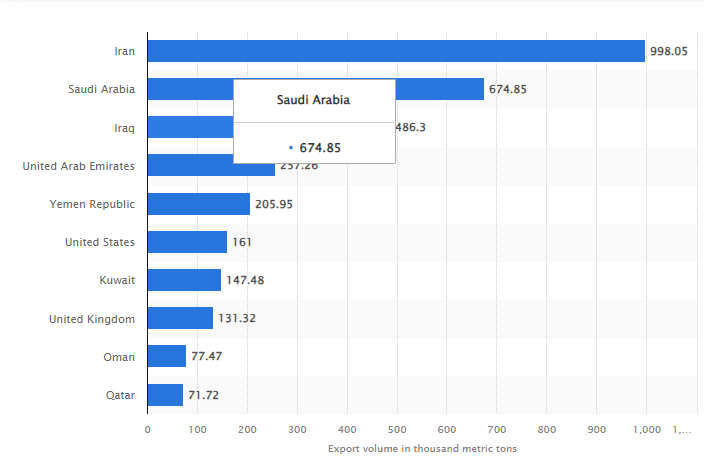The global rice market has been experiencing an uncertain future due to the recent rice ban by the Indian government. As India is one of the world’s largest exporters of rice, this decision has sent shockwaves through the industry, with stakeholders bracing themselves for potential disturbances. This essay will analyze the impact of India’s decision on global rice markets, with a focus on pricing, production and trade dependencies.
The Indian Rice Market: An Overview
India has long been a prominent player in the global rice market, both in terms of production and exports. If you are curious about how much rice is exported from India, Statista analysis shows that the country is the world’s second-largest producer of rice, with a share of around 26% of global rice output in 2021 (Chart 1). It is estimated that India produced more than 120 million metric tons (MMT) of rice in the same year.

What Type of Rice is Exported from India?
As previously stated, the country is widely recognized as the world’s largest exporter of basmati rice, with Saudi Arabia, Iran, Iraq, United Arab Emirates, Yemen and the United States being the top buyers. The country’s basmati rice industry has been growing steadily over the past few years, with exports reaching 4.5 million metric tons in 2022/23. This growth has been sparked by the increasing demand for the grain, both domestically and abroad, which has led to the Indian government taking the surprise action of banning exports of non-basmati white rice in an effort to help bring down retail rice prices. As a result, some buyers are now requesting early shipments of basmati rice out of fear that the government might also put restrictions on exports of the popular grain.
The main producers of basmati rice are located in the northern states of Punjab, Haryana, Uttar Pradesh and Himachal Pradesh. The recent heavy monsoon rains caused significant damage to crops, but the area dedicated to growing basmati rice has increased in 2023, leading to an increase in production. This increased production, coupled with the fear of export restrictions, has led to buyers requesting early shipments of the grain. The increased demand for basmati rice has also been beneficial to Indian farmers, as many of them have switched from growing non-basmati varieties to basmati out of economic necessity.

India’s rice market is facing a unique situation due to the government’s ban on non-basmati white rice exports. By limiting the supply of non-basmati rice, it has increased demand for basmati, leading to higher prices and increased production. Buyers are now scrambling to get their hands on the grain, leading to requests for early shipments. With the Indian basmati rice industry experiencing a surge in demand, it is likely to remain competitive in the global market and help contribute to the country’s overall rice production.
Impact of the Indian Rice Export Ban on Pricing
The restriction on rice exports from India is likely to have a considerable impact on global rice prices. With India’s ban disrupting the supply chain, the demand for rice from other exporting countries is expected to surge. As a result, a spike in prices is likely, leading to higher costs for rice-consuming nations. The rice market in India is highly competitive, and the ban could result in increased domestic prices as the supply diminishes. This could lead to food insecurity in countries that rely on affordable Indian rice, such as Iran, which imported over 998 thousand metric tons of basmati rice in 2022. This fragrant long-grain rice is grown in 34 varieties across seven Indian states—Jammu and Kashmir, Himachal Pradesh, Punjab, Haryana, Delhi, Uttarakhand, and Uttar Pradesh—and has become a staple in many countries.

Production and Self-Sufficiency
India’s decision to stop rice exports indicates potential concerns over internal food security and self-sufficiency. The ban reflects the Indian government’s efforts to ensure that there’s enough supply of rice for its domestic population amidst rising food inflation and a steady increase in the population. With a massive domestic demand, restricting rice exports allows India to prioritize its population’s needs over international trade obligations. However, this step raises questions about the country’s rice production capacity and long-term sustainability.
Trade Dependencies and Market Shifts
The Indian ban on the export of rice may lead to significant market shifts as countries heavily reliant on Indian rice explore alternative suppliers. India’s rice exports have been crucial for meeting the demand of various nations, particularly in parts of Africa and Asia (Statista, 2022). For these countries, finding alternative sources of rice could pose logistical and economic challenges.
Moreover, countries that rely on India’s lower-priced rice may face increased costs from other suppliers. It remains to be seen how this shift in market dynamics will impact global trade in the long run.
How to import rice from India to other countries?
Every year, billions of dollars are spent to bring rice from India to countries around the world. This beloved staple of many cuisines is the perfect way to add some exotic flavor to your dishes.

At MT Royal Company, we understand how important it is to import rice from India in a safe and efficient manner. We are a top provider of Basmati Indian rice in Turkey and actively monitor the situation closely, exploring the potential risks and opportunities that the industry might face. Our experienced team of experts ensures that all import and export procedures are strictly followed, allowing us to provide our customers with the highest quality and safest rice available. We are committed to providing the best service and products, and our clients can rely on us to deliver the best solutions for their needs.
Our commitment to quality also extends to our services. We have a team of experienced professionals who are knowledgeable about the regulations and customs requirements for importing rice from India. They are able to provide the best advice and guidance for our clients to ensure that they are able to transport their rice safely and efficiently. In addition, our staff is dedicated to helping you save time and costs, enabling them to focus on the core of their business.

At MT Royal Company, we are passionate about bringing the best Indian rice to our customers. With our expertise and dedication, we guarantee that our customers will have the best experience possible when importing rice from India.
Altinmarka Cocoa Powder s8 and s9
Cocoa powder turkey price LATAMARKO
Pastino Tomato Paste Production Process






No comment